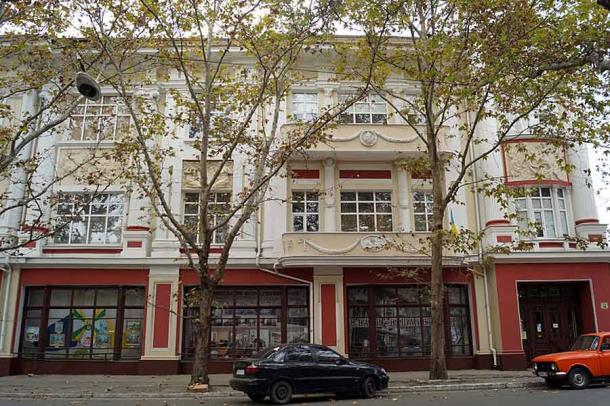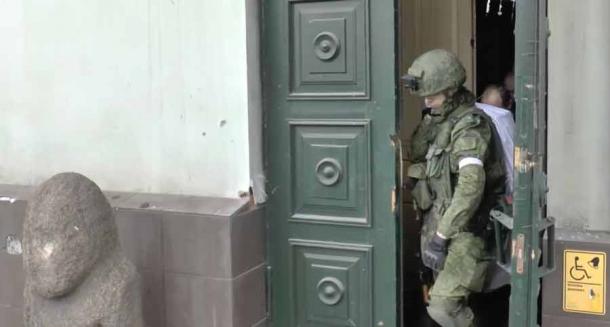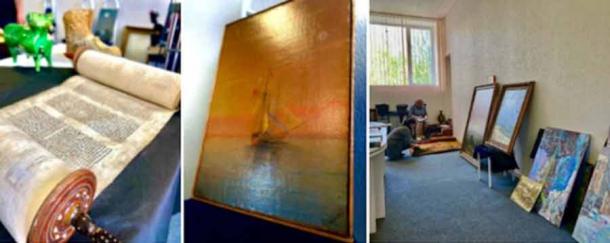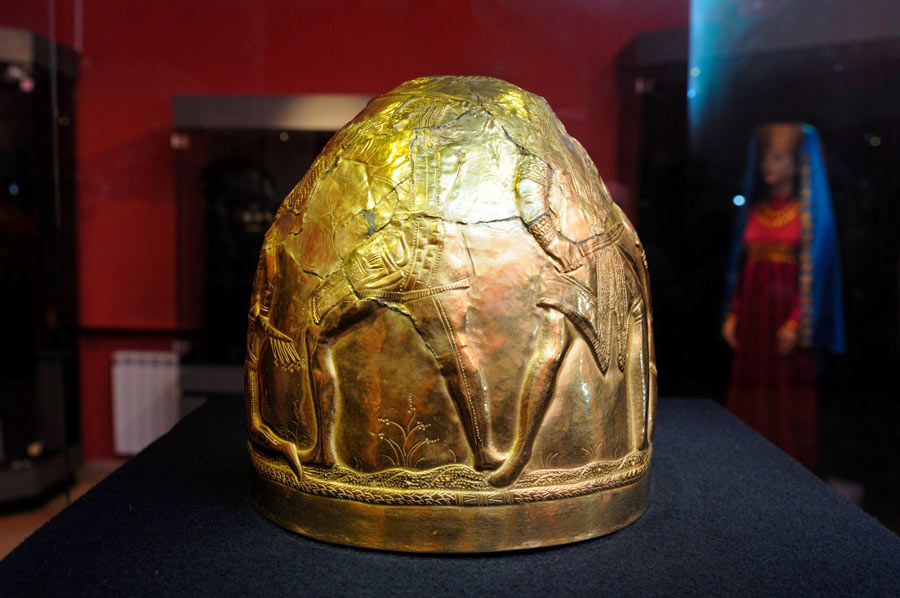Russian Soldiers Empty Ukraine Museum Of Scythian Artifacts
Russian soldiers have entered a Ukrainian museum where they stole a priceless collection of ancient artifacts. Their haul included a 2,300-year-old Scythian gold crown.
The ancient crown was used by a Scythian ruler some 2,300 years ago. The Scythians were a 7th to 2nd century BC group of nomadic tribes who inhabited Ukraine, central Asia and the Middle East. Scythian horse-people were master’s with the bow and arrow and they invaded Europe centuries before Genghis Khan or Charlemagne. Now, the priceless headpiece is heading to Crimea to be used as a political tool.
Looking Down The Barrel Of A Russian Rifle
Armed Russian troops accompanied an artifacts specialist into the Museum of Local Lore in occupied Melitopol on Friday. Reports say they illegally removed ‘198 treasures.’ Staff member Leila Ibrahimova said the staff tried to hide the most important relics and artifacts, ‘but somehow’ the [Russian Soldiers] found them.
‘Somehow.’ In this instance the ‘somehow’ turned out to be ‘someone’ - the recently Russian military-appointed director, Yevhen Horlachev.
- Long Hidden Scythian Treasure Site Located at Ceremonial Spring in Poland
- Rethinking Stereotypes: Were Scythian Warriors Really Nomadic?

Melitopol Museum of Local Lore, Ukrainian museum targeted by the Russians for its Scythian gold artifacts. (CC BY-SA 4.0)
They Come In The Night
Mr Ivan Fedorov, Mayor of Melitopol, was imprisoned and ‘psychologically tortured’ for six days before he was swapped in a ‘prisoner exchange,’ according to the Daily Mail. Fedorov told the press that the Russian soldiers ‘came to me at night.’ Five or seven soldiers arrested the mayor and put a plastic bag over his head and took him out of a building.
‘They wanted to make an example of me,’ said Fedorov, to show people what would happen if they failed to do exactly what the Russians wanted. He said half the city was destroyed and that there is no more food or medicine. Furthermore, in excess of ‘200 people have been kidnapped’ so it’s not safe to walk the streets,' he added.
Mayor Fedorov concluded that ‘Orcs have taken hold of our Scythian gold’. Orcs were of course the ugly, violent and malevolent race of monsters created by Tolkien. The mayor said that while nobody knows where the Russian soldiers took the treasures, ‘we hope we can get it back.' It is thought Putin will now order his army to move the stolen Ukrainian treasures to annexed Crimea.
Targeting the Coveted Scythian Gold Art
Historians regard the Scythians as ‘relentless punishers’ who tied the skin of their slayed enemies to their horses as trophies of war. In 430 BC Herodotus wrote Histories, in which he said of the Scythian rider, he ‘hangs the handkerchiefs on the bridle of his horse, and is very proud of them. The best man is the man who has the greatest number.'
Furthermore, the Greek historian wrote that Scythian warriors were renowned for rubbing their enemies’ scalps in their hands ‘to soften it enough to be used as handkerchiefs.’
Knowing they were under attack, staff at a museum in Melitopol had hidden a collection of the priceless artifacts in a dark cellar. However, Russian troops threatened them at gunpoint to reveal the whereabouts of the treasures. New York Times reported that when soldiers pointed guns at the caretaker, and insisted he take them to the cellar, ‘the man still refused.’ However, Daily Mail reports that the Russian military-appointed museum director simply ‘handed over the gold.’
- The Royal Kurgan of Kerch: The burial mound built by a king
- The Tiara of Saitaphernes: Wow Antique? Fake? Fine Art? Find Out

Russian soldier leaving a Mariupol museum with a bag of objects. (Petro Andriushchenko)
Other Ukrainian Museums Targeted
And it seems it is not just the gold that the Russians are after, but depriving Ukraine of other cultural treasures. In Mariupol, the City Council posting on Telegram, has accused Russia of stealing over 2000 artworks from the city museums, including ‘A handwritten Torah scroll and paintings by Arkhip Kuindzhi and Ivan Aivazovsky’ from the Landscape Art Museum.
Further items include an 1811 Bible, and 200 medals from the Museum of Medallion Art, reports Hyperallergic. As of May 2, UNESCO has confirmed damage to 120 cultural sites in Ukraine, including 10 museums and 7 libraries, amongst others.

Some of the works of art allegedly removed from the Mariupol Landscape Art Museum (Mariupol City Council)
Antiques Are Top Level Targets For War Mongers
It was only in 2014 that Volodomyr Aryev, a Ukrainian parliamentarian, called for the United Nations to intervene and stop the ‘looting of museums in Crimea by the Russian occupation authorities.’ Reports at the time said Moscow was accused of trying to ‘change the cultural and ethnic face’ of the entire peninsula. Such actions, he noted, were in ‘violation of international law, including the UN Convention on Genocide, which prohibits such actions’.
Mr Rada said Russian occupation authorities ‘carried away pictures from the museums of Crimea to the museums of Russia, and to the Hermitage of St. Petersburg in the first instance.’ The politician said this move marked ‘the beginning of the mass export of cultural and historical values and artistic subjects.’ It’s not that Aryev was close, but he hit the bullseye, as the recent raid on the museum in Melitopol illustrates.
Top image: Representative Scythian gold warrior helmet kept in the National History Museum Kyiv. Source: Yurii Zushchyk/Adobe Stock
By Ashley Cowie




















Comments
If the theft is real it could easily have been looted by the invaiding army for their own selfish purposes. Every war I’ve ever studied has soldiers searching the vanquished for trophies. The gold could be easily melted down, and make a nice present for a junior officer to take home.
Telegram is a social media and news platform that is overflowing with propaganda. I've seen many examples of thoroughly debunked claims. Some of them were clearly actual set-ups. Others are reused photographs. In fact, one could run a book on which country will feature next in the eastern European fantasy land fix. The Middle East is full of favourites, as it's a good source of photographs of atrocities and bombings.
It may be easy to laugh off one who continually says, "No one gets paid to tell the truth." However, one maý interpret that reasonably, at times, as 'Some are paid to not tell the truth.'
That, indeed, is the truth and we should all be aware of it. And that applies irrespective of the truth or lack of it in this Scythian case.
Just to clarify - I don't mistrust Zelenko. He was right about his Covid treatments. And that's not all he's right about.
The "Orcs" reference makes it sound like a work of fiction. In fact, some of it is definitely fiction, which makes the rest (the Scythian treasure pilfering) sound highly suspect.
I don't particularly trust Putin, but having followed events closely I have come to the conclusion that some news about him is not entirely to be trusted, to put it mildly. Indeed, Dr Vladimir Zelenko, Trump's personal Covid physician, has said that he doesn't trust what's coming out of Kyiv and he was born there. Zelenko happens to be Hassidic for that matter. And for the record, I don't entirely trust Trump either.
There is a world of information out there. There's also a world of misinformation and, from what I've seen, a whole lot of it is cloaked in blue and yellow, just like the Neo-Nazis that don't exist there but definitely do. Nothing I've seen before now, however, had been cloaked in Tolkien. That's next level emotional claptrap.
Ancient origins declares its political bias therefore introducing an element of …………...
Pages